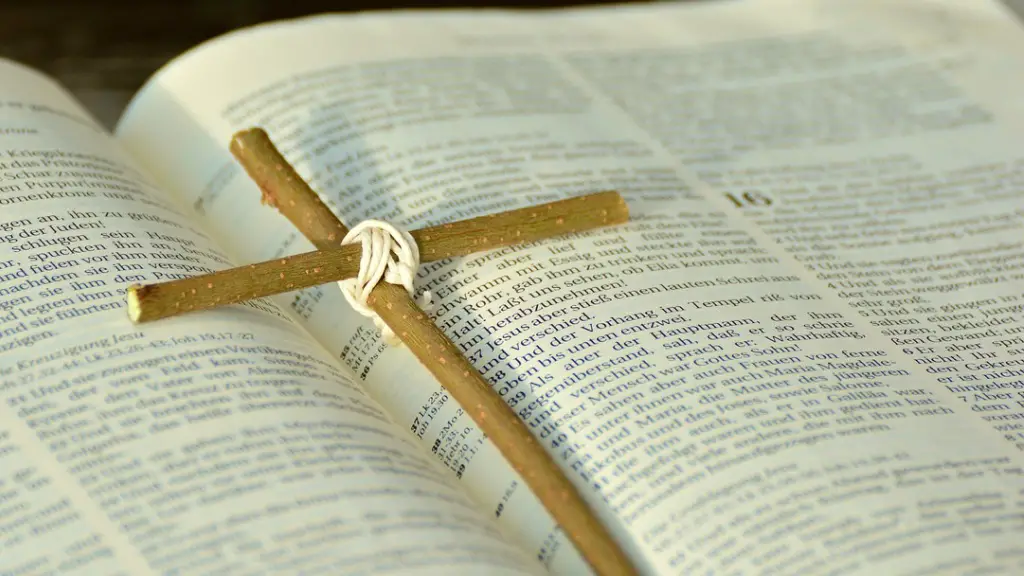Drink offerings, also known as libations, are described in the Bible as an offering of liquid to God. The drink offering is an act of worship and devotion, typically poured out in public as sign of respect. It is a custom recognised in many religions and cultures, but particularly so in Bible times. In the Old Testament, the drink offering is mentioned in various rituals. For example, it is the offering mentioned in Leviticus 23:18 and Numbers 28:7. Both passages describe the drink offering as being a mixture of a quarter-homer of wine and a quarter-homer of water.
In biblical times, wine was the most commonly used drink offering. This is because it was a symbol both of abundance and of joy. It was an expression of thanksgiving as well as an offering of reverence. For this reason, it was often used in both public and private rituals. According to Leviticus 23:18, the drink offering was to be presented with a meal offering and grain offering when brought before the Lord.
During the Jewish Passover, four cups of wine were used for the celebration. This was symbolic of the four deliverances that God had promised the Jews, and was a sign of homage to the Lord. The drink offering was also used as part of other festivals such as Pentecost and the Feast of Tabernacles. In each case, it was associated with thanksgiving and celebration. In the New Testament, Jesus is seen sharing a cup of wine with his disciples at the Last Supper.
In modern times, the drink offering has been largely replaced by more symbolic forms of ritual offerings such as prayer and song. However, the concept of offering a drink to God is still recognised and honoured in some sects of Christianity. In Christian Worship, some churches use a small cup of grape juice instead of wine to signify the offering of a drink to the Lord.
Although the drink offering is no longer a common practice, it is still important to remember that it symbolised the respectful reverence and thanksgiving to the Lord. The drink offering recognised the powerful deliverance of God and the joy that he brings. It was a way of expressing gratitude and showing humble obedience to the Lord, which remains important today.
Biblical Sacrifices
A drink offering was not only an important part of ceremonial rituals but also of sacrificial offerings. Usually, after an animal had been sacrificed, a drink offering was poured over the head of the animal. This was done to give thanks to God for the graciousness of the offering. In the case of biblical sacrifices, the drink offering was a way of expressing thanks for the gift of life the animal had sacrificed. The Bible also encourages giving thank offerings, where people brought a drink offering as a symbol of their gratitude and dedication to the Lord.
In addition to a drink offering as part of a sacrificial offering, the Bible also mentions a drink offering that was to accompany the ceremonial burning of a meal offering. According to Leviticus 2:9, the drink offering was poured over the burnt offering, sprinkling the Lord’s offered sacrifice. By doing this, the people were expressing their thanks and acknowledgement of the Lord’s power.
The drink offering was an important act of worship and a way of connecting with God. It was an act of dedication and thanksgiving, and a sign of respect that showed reverence to the Lord. Drink offering was a visible and tangible way of expressing one’s love and devotion to the Lord.
Implications for Today
The drink offering serves as a reminder that even in our haste and busyness we can still take the time to give thanks to God. Today, this modern-day equivalent might involve silent prayer, words of thanks, or a tangible gesture of grace. Whatever it looks like, the importance of expressing thanks to the Lord remains intact.
In a world full of strife and chaos, dedicating time and resources to thank God for the good in our lives serves as a sign of humility and reverence. It is a powerful reminder that, in spite of all the bad, God still exists and reigns over all.
The Bible speaks of the drink offering as a tangible act of worship and thanksgiving. It is a symbol of our dependence on God and of our enduring reverence for Him. It is a reminder that, in times of joy and sadness, we can always turn to the Lord and express our thanks, knowing that it is only through His mercy that we have been given life.
Overview of the Drinking Offering
The drink offering, while largely unused in today’s world, was an important symbolic act in ancient times. It was an act of dedication to the Lord and an offering of thanksgiving and joy. The presentation of wine and water was a sign of abundance, representing the abundance of the Lord’s blessings. By pouring out a drink offering, people were expressing their total dependence on the Lord.
Though the ritual of drink offerings is no longer prominent in religious practice, it serves as an important reminder to thank the Lord for all His mercy and grace. The Bible encourages us to find ways to express our love and respect for the Lord, and the drink offering is just one example of how this can be done.
Drink Offering Followers
The drink offering has been largely abandoned in modern-day Christianity, with more symbolic forms being adopted in place of the drink offering. However, some Christian denominations still practice the traditional drink offering as part of their services. For example, the Greek Orthodox Church often includes a small cup of wine as part of their Eucharist service.
The drink offering is also found in some Christian sects such as the Churches of Christ, who use grape juice instead of wine in keeping with the biblical instruction. Other sects such as the Quakers and Brethren assemblies practice a form of memorial worship where the worshippers share a cup of wine to remember the sacrifice of Jesus.
The practice of partaking of a drink is also found in other world religions, such as Hinduism and Buddhism, although the form and purpose of the drink offering may differ from the Christian tradition. Nevertheless, the symbolic act of offering a drink to God remains an important part of many religious practices.
Responding to The Drink Offering
The drink offering is an act of worship and thanksgiving that is still recognised and practised in some Christian denominations today. It is a reminder that dedication to the Lord and thanksgiving for His grace should always be at the centre of our lives. Though the drink offering may no longer be a regular part of Christian practices, its symbol of gratitude and reverence still has the power to raise a spirit of reverence in our hearts.
It is important to remember that, even in the absence of a ritualistic practice, we can still express our thanks and reverence to God in times of joy and sadness. As we raise our spirits in thanksgiving and awe for the Lord, let us make it a point to take time each day to give thanks for all the Lord’s goodness and mercy. Let us find ways to acknowledge the Lord’s presence, and to express our humility and worship to Him through prayer and service.
Importance of The Drink Offering
Though the physical practice of a drink offering may no longer be a common ritual, its symbolic value remains important. It is a reminder to us all to take the time to give thanks to the Lord and show our respect and reverence to Him. By taking moments of pause and reflection, we can all pause and acknowledge the power of the Lord and express our thanks.
Though the form of the drink offering may have changed over the centuries, its message remains the same: in the face of sorrow and joy, take the time to express thanks and reverence to the Lord. Let us be conscious of His grace and mercy, and strive to offer Him faithful prayers, humble praises and devoted love.
Fulfilling the Drink Offering
In modern times, the physical practice of a drink offering is rarely seen in Christian worship. However, that does not mean that the symbolic gesture of giving thanks and reverence to the Lord has been forgotten. In spite of all the distractions of the world, every act of dedication and thanksgiving to the Lord should be valued and cherished.
We can express our gratitude and love to the Lord through prayer, service and acts of kindness. We can also become active proponents of justice and mercy, looking for and responding to the signs of need around us. Every act of love and respect for the Lord is an act of honouring the drink offering.
The drink offering, then, remains an important way to express one’s reverence and love for God, even in the modern world. Let us take time every day to give thanks and show our devotion to the Lord, and remind ourselves to never tire of acknowledging Him with humble hearts and faithful spirits.





